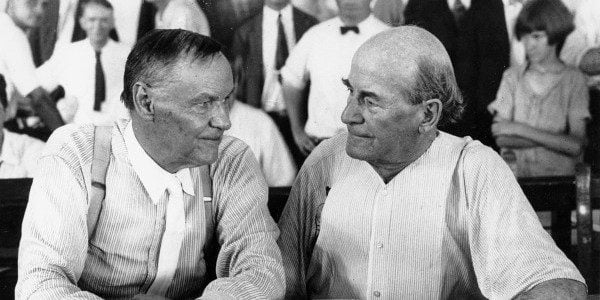This is the seventh post in a series of a series I have been writing over the past several months in which I describe my journey through Evangelicalism and “out the other side.”
Contemporary Evangelicalism emerged out of a crisis of identity and with a recognized need to better handle the challenges of modernity.

The theological leaders of “ne0-Evangelicalism” did not want to be the backwoods, backwards, fundamentalists on display during the famous Scopes Monkey trial of Dayton, TN. They insisted on the “fundamentals” of what they considered to be orthodox Evangelical doctrine, but they wanted to put a sophisticated Evangelical mind behind of (or in front of) those fundamentals, and they knew they had to intellectually engage issues raised by modern science.
Unfortunately, so much of that engagement ended up being driven by either aggressive or defensive apologetic strategies--defending the truth of divinely revealed Scripture against the presumed falsehoods of humanistic science. The new Evangelicalism was, by and large, a more sophisticated fundamentalism.
Conservative Evangelicals have far too often played into the script of the “conflict model” of science versus Scripture. There have been exceptions–and we are seeing a lot of effort undertaken within Evangelical colleges, seminaries, and Templeton-funded institutions like Biologos to explore questions at the complex intersection of theology and science.
Many of the theologians and scientists involved in this front-line work use a dialogue or integration model and they attempt to synthesize the truths of Scripture and divine revelation with the knowledge of the world given to us through scientific exploration. But this is challenging work, indeed, and involves a good bit of rethinking and re-working of cherished assumptions and inherited beliefs.
On the flip side, we are seeing colleges and seminaries firing popular theology and science professors for attempting this difficult integrative work. Bruce Waltke, Peter Enns, Tom Oord are some of the well known causalities of the war. Most recently–philosophy professor Jim Stump was forced to resign his position at Bethel College (Indiana) due to that institution’s recent addition of a historical Adam clause in their statement of faith. Due to Stump’s affiliation with Biologos, they offered a statement responding to his resignation from Bethel. In that statement, they gracefully but pointedly stated the issue confronting Evangelical institutions:
We at BioLogos are disheartened by this decision. It put Jim in the painful situation of having to choose between the scholarship to which he feels called and the academic community to which he has belonged for decades. We are deeply aware of the challenges of discussing human origins in an evangelical context. We also respect the Board’s right to set boundaries on that discussion at their institution. Yet we are concerned that a decision like this effectively sets faith commitments in opposition to clear scientific evidence in God’s creation. We would like to see Christian colleges encouraging their scholars to engage the scientific evidence that humans evolved, and acknowledge that this can be done without letting go of biblical authority. The issues are complex and interdisciplinary, so the evangelical church needs to hear the insights of many Christian philosophers, biologists, theologians, and other scholars. We are also concerned that Christian college students, especially those who feel called to scientific careers, will see policies like this as a sign of conflict between Christianity and science and feel forced to make an unnecessary choice between them.
During my college years at Wheaton I first confronted, head-on, the challenge of reconciling science and Christian theology. The dictum “all truth is God’s truth” echoed through the hallways and classrooms there, in large part due to the influence of renowned philosophy professor Art Holmes. (Perhaps ironically–or even sadly, depending on one’s perspective–Wheaton has a “historical Adam” clause in its statement of faith).
In my understanding of the phrase, if we accept that “all truth is God’s truth” we should jettison the notion that the Bible is the source of “true truth” (to use Francis Schaeffer’s unfortunate phrase), while all other sources of truth must simply conform to whatever the Bible says about any given topic. Or, in the bravado of a well-known young-earth creationist: “Whenever the Bible and science conflict, I go with the Bible every time!”
During my tenure at Bethel Seminary, I taught a course called Theology and Science. Not having any expertise on the science side, I had a lot of catch-up work to do. I benefited from reading people like Karl Giberson, John Polkinghorne, Francis Collins, Keith Miller, Nancey Murphy, Alastair McGrath, John Walton, and others. These are people who are taking very seriously the respective truth discourses of theology, Bible, and science, and who aim to integrate truth into a coherent whole.
I realized quickly that Evangelical seminary students have very little exposure to complex discussions of the relation between science and theology. They often come into seminary (as I did) with little science background and with only peripheral exposure to questions and issues around the intersection of science and religion. Some of them come in assuming the incompatibility between science and faith, at least on deeply contested issues around creation / origins and Adam / original sin. But once they get a little bit of exposure, their eyes are mostly opened to new possibilities–and they begin to grasp the beauty of the possibilities as well as the enormity of the challenges .
The most daunting of the challenges go beyond the theological to the practical, personal, and vocational. What would happen to them if they took that information with them into the churches and denominations that employed them? Would their elder board or deacons or church council run them out of town? How would members of their own families respond to them? The potential economic, vocational, and even relational costs of rethinking cherished assumptions are potentially enormous.
For the final part of this essay, I’ll name a few of the key themes that are raised by the “collision” of theology and science. Some of them bring up concerns I have previously addressed in this blog series.
1. The “Authority of the Bible”
As I’ve previously mentioned, N.T. Wright points out that it’s very easy to affirm that the Bible is authoritative. But this is not yet to say how the Bible’s authority works itself out on any given issue of the day. What do we mean by authority? How is a biblical story, poem, genealogy, religious satire, or even myth authoritative? When we read Genesis 1-3, for a prominent example, we must ask questions like, “What is this teaching us? What is being communicated?” And even, “Given what we know to be the case–the truth, even, about cosmological, geological, and human origins–how ought we to understand this text theologically in light also of what we know about the text from a literary point of view?”
The best way forward for Evangelicals in beginning to raise questions pertaining to the integration of biblical authority and science would be to jettison the notion of inerrancy. It does more harm than good. But for most neo-Evangelical institutions, this bold move is not likely to happen anytime soon.
2. The Providence of God
If we accept the scientific consensus regarding cosmological and human origins (granted, I’m taking “consensus” in a general, broad-brush sense–there are variations, nuance, and shades of disagreement on details), can we also affirm that God is “provident”–that God over-sees the process of creation and evolution? (Answer: Yes). The issue of divine providence, it seems to me, deserves a much bigger role in these conversations than it currently is offered. I bet that a lot of hand-wringing and anxiety could be alleviated if we (theistic evolutionists) could find a better way to talk about (and to affirm at some level) that God is provident and integrally involved in creation and its ongoing unfolding in time.
3. The Dependence of Creation on God for its Existence
This issue is related to the providence of God. Can we affirm that creation itself is dependent on God–more than God is dependent on creation? (Answer: Yes). Does the freedom that God allows creation to enjoy–to “play with,” so to speak, imply that God is not also deeply invested in and involved in that creation? (Answer: No). Must God be a cosmic micro-manager, for Christian faith and theology to be meaningful and “orthodox”? (Answer: No).
Whatever one’s view of God’s providence, it’s important to affirm that God created the universe (it depends on God for existence) and that God continues to sustain it and interact with it in some causal way. Any of the primary positions can articulate a view of God’s providence as a kind of interaction and meaningful involvement with creation. A God who interacts in and through natural processes, even a God who interacts in and through free processes, can still be a providential, relational God. I would argue that such freedom is necessary for God to be relational with the world–and with us.
4. The Uniqueness of Humanity as Created in the Image of God
Can we both affirm biological evolution and the uniqueness of humanity as created in the image of God? (Answer: Yes). Can we affirm evolution as well as the reality of, the pervasiveness, and even the inevitability of sin? (Answer: Yes). On this last point, by the way, I suggest that we’re better off leaving Augustine’s formulation of original sin behind and adopting something more like the dual concepts of “originary” and “inherited” sin. There was a time when sin came into being among early homo sapiens, and sin has been “passed along” through both procreation (genetic inheritance) and socialization.
Evolution’s greatest threat, as perceived by Christians, was and still continues to be the uniqueness of humanity. If human beings descended from prior species, are cousins with chimpanzees, and share the same family tree with all life, then how do we understand the biblical witness to their unique relation to God as being in the imago Dei? Young Earth Creationists insist that only “ground-up” creation of the human species, ex nihilo, can preserve human uniqueness. But perhaps, first of all, we shouldn’t be so concerned about uniqueness per se, and instead understand that the image of God does not consist in biological features, but in our collective responsibility to steward creation and reflect God’s concerns for creation and right relationship in the world. If that’s so, how are we doing with that
5. Why Death, Evil, and Suffering?
This may be the trickiest set of issues among them all. Young earth creationists can say that evil, death (at least human death ) come about because of the original sin of the first two humans. Most would say that evil and suffering hearkens back further to a primordial fall of the angelic beings. In any case, if they believe in divine providence and in divine foreknowledge, they should acknowledge that Adam and Eve do not get God “off the hook,” since their sin was God’s plan, anyway.
Theistic evolutionists face into the difficult problem that, since 98% of all species that have ever existed are now extinct, the history of evolution/creation includes a hell of a lot of suffering and death–and trial and error–along the way. Evolutionary creationists lack the simplicity of the single, historical act as the “cause,” but they have the advantage of accounting for the scientific evidence of death and suffering having occurred for millions and even billions of years. As for why God would “allow” such evil and suffering, they can refer to God’s relationality and love and to God’s fundamental willingness to create something other than God which is free to continue create itself. They can also refer to God’s solidarity with that world and to God’s willingness to suffer, kenotically (by voluntarily relinquishing power or control) with it–and to God’s promise to ultimately redeem it.
These five issues only scratch the surface. We haven’t even begun to raise a whole host of ethical issues raised by the science-theology dialogue, including the ethics of genetic replication, sexual orientation/identity, end of life issues, beginning of life issues, and ecological science and responsibility.
I feel compelled to note here that of the seven issues I have raised in my Leaving Evangelicalism series, this one has been the most interesting to write. It appears that Evangelicalism is reaching something of a crossroads, and its future could shake out in any number of ways. Its future will depend, in large part I think, on the willingness of its academics, its pastors and denominational leaders, and other institutional leaders, to engage with truth openhanded, honestly, and with epistemic humility.
By truth I mean all truth–not just the truth that they like or that fits the parameters of the tribal identity that seems to be required to sustain “Evangelicalism” in some perceived pure form.
As a final note, I acknowledge that the problem of picking and choosing “truth” is not unique to Evangelicalism, or to conservative Christianity. It is a problem–and a temptation–that all humans and all religious and ideological expressions face, though in differing ways and with different questions at play.
Stay in the loop! For more theology and society related links and discussions, like/follow Unsystematic Theology on Facebook!













